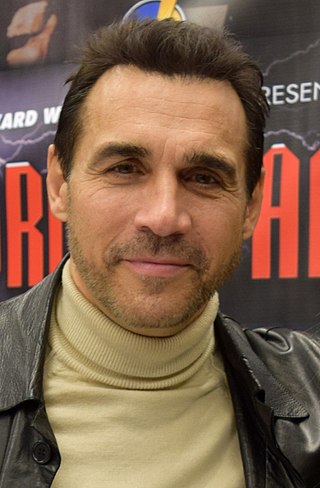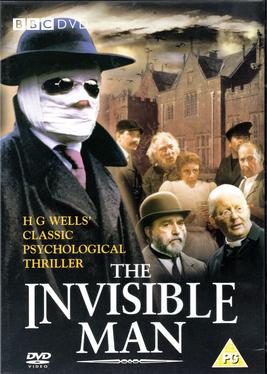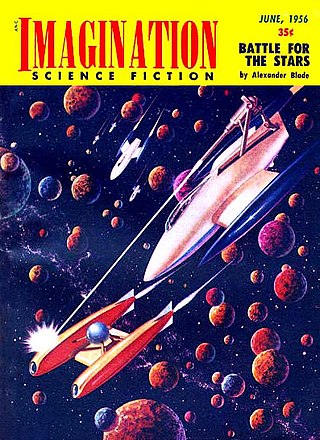
Galaxy Quest is a 1999 American science fiction comedy film directed by Dean Parisot and written by David Howard and Robert Gordon. A parody of and homage to science-fiction films and series, especially Star Trek and its fandom, the film depicts the cast of a fictional cult television series, Galaxy Quest, who are drawn into a real interstellar conflict by actual aliens who think the series is an accurate documentary. It stars Tim Allen, Sigourney Weaver, Alan Rickman, Tony Shalhoub, Sam Rockwell, and Daryl Mitchell. The film was a modest box office success and positively received by critics: It won the Hugo Award for Best Dramatic Presentation and the Nebula Award for Best Script. It was also nominated for 10 Saturn Awards, including Best Science Fiction Film and Best Director for Parisot, Best Actress for Weaver, and Best Supporting Actor for Rickman, with Allen winning Best Actor.

Science fiction is a genre of speculative fiction, which typically deals with imaginative and futuristic concepts such as advanced science and technology, space exploration, time travel, parallel universes, and extraterrestrial life. It is related to fantasy, horror, and superhero fiction and contains many subgenres. Its exact definition has long been disputed among authors, critics, scholars, and readers.
Science fiction comedy or comic science fiction is a subgenre of science fiction or science fantasy that exploits the science fiction genre's conventions for comedic effect. Comic science fiction often mocks or satirizes standard science fiction conventions, concepts and tropes – such as alien invasion of Earth, interstellar travel, or futuristic technology. It can also satirize and criticize present-day society.

Adrian Paul Hewett is an English actor best known for the title role of Duncan MacLeod on the television series Highlander: The Series. In 1997, he founded the Peace Fund charitable organisation.
Robin McMaugh Klein is an Australian author of books for children. She was born in Kempsey, New South Wales, Australia, and now resides near Melbourne.

Michael Emmet Walsh was an American actor who appeared in over 200 films and television series, including supporting roles as Earl Frank in Straight Time (1978), the Madman in The Jerk (1979), Captain Bryant in Blade Runner (1982), Harv in Critters (1986), and Walt Scheel in Christmas with the Kranks (2004). He starred as private detective Loren Visser in Blood Simple (1984), the Coen brothers' first film, for which he won the Independent Spirit Award for Best Male Lead.

The mythology of the Stargate franchise is a complex and eclectic fictional backstory, which is presented as being historical, of the Stargate premise. A "rich mythology and world-building" are used to establish "a vast cosmology and an interesting alternate take on the history of Earth"; a defining feature is "its use of ancient mythology, with stories that take inspiration from multiple places around the globe". Narratives center around xeno-mythology as experienced by humans during episodic contact with alien races. Audiences across a variety of platforms - including TV series, novels, comics and movies - witness the people of Earth exploring a fictional universe using the Stargate. Species established early on in the franchise recur throughout, with one adversary often dominating a particular story arc, which can continue across several seasons.
John Kenneth Muir is an American literary critic. As of 2022, he has written thirty reference books in the fields of film and television, with a particular focus on the horror and science fiction genres.

Weird West is a term used for the hybrid genres of fantasy Western, horror Western and science fiction Western. The term originated with DC's Weird Western Tales in 1972, but the idea is older as the genres have been blended since the 1930s, possibly earlier, in B-movie Westerns, comic books, movie serials and pulp magazines. Individually, the hybrid genres combine elements of the Western genre with those of fantasy, horror and science fiction respectively.

Halfway Across the Galaxy and Turn Left is a 1985 novel by Australian children's author Robin Klein which also became a children's television series.

Space Western is a subgenre of science fiction that uses the themes and tropes of Westerns within science-fiction stories in an outer space setting. Subtle influences may include exploration of new, lawless frontiers, while more overt influences may feature literal cowboys in outer space who use rayguns and ride robotic horses. Although initially popular, a strong backlash against perceived hack writing caused the genre to become a subtler influence until the 1980s, when it regained popularity. A further critical reappraisal occurred during the 2000s due to critical acclaim for Firefly.
Melody Perkins is an American actress, model and dancer. She is known for her regular role as the villainess later turned heroine Astronema/Karone in Power Rangers in Space, and became the Pink Ranger in Power Rangers Lost Galaxy.
Nina Landis is an Australian stage and screen actress, who trained in Australia and New York. Her feature film credits include the title role (Rikky) in Rikky and Pete, Komodo, Four of a Kind, Handle with Care, and Blackjack: Sweet Science. Her principal roles on television include Embassy, Prime Time, The Keepers, One Summer Again, MDA, The Flying Doctors, Prisoner, A Country Practice. She has performed on the stages of national theatre companies and fringe theatres. Landis also lectures on acting, is a voice-over artist, and a documentary photographer.
Sean Six is an American actor who started acting at the age of 8. His first role was in the theater, in a production of Fiddler on the Roof at the San Francisco Civic Auditorium. He is best known for his role as the Tenctonese teenager, Buck Francisco, in the cult science fiction TV series Alien Nation.

The Invisible Man is a six-part television serial based on the science fiction/fantasy novella by H. G. Wells, screened by the BBC in the UK throughout September and October 1984. It was produced as part of the BBC 1 Classic Serial strand, which incorporated numerous television adaptations of classic novels screened in serial form on Sunday afternoons. Out of all the numerous film and TV versions of H. G. Wells' 1897 book, this remains to date the most faithful to the original text. The series was adapted by James Andrew Hall and directed by Brian Lighthill.
Roger Sloman is an English actor known for his work in theatre, film and television.
Science fiction television has been produced in Australia since the 1960s, as a homegrown response to imported overseas US and British shows.

Space opera is a subgenre of science fiction that emphasizes space warfare, with use of melodramatic, risk-taking space adventures, relationships, and chivalric romance. Set mainly or entirely in outer space, it features technological and social advancements in faster-than-light travel, futuristic weapons, and sophisticated technology, on a backdrop of galactic empires and interstellar wars with fictional aliens, often in fictional galaxies. The term does not refer to opera music, but instead originally referred to the melodrama, scope, and formulaicness of operas, much as used in "horse opera", a 1930s phrase for a clichéd and formulaic Western film, and "soap opera", a melodramatic television series. Space operas emerged in the 1930s and continue to be produced in literature, film, comics, television, video games and board games.







